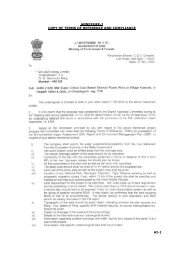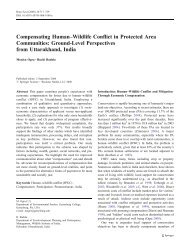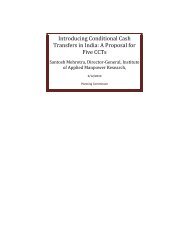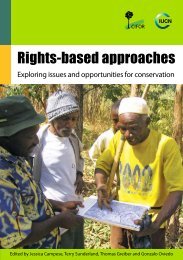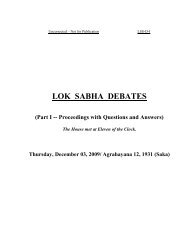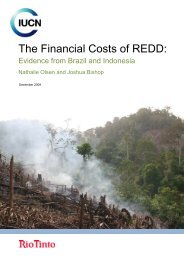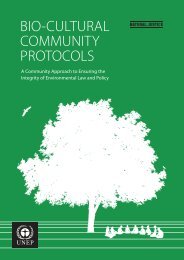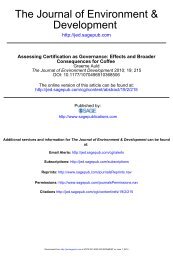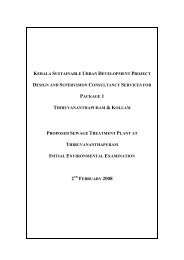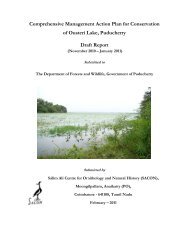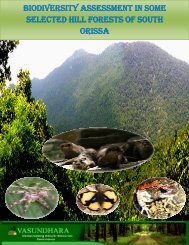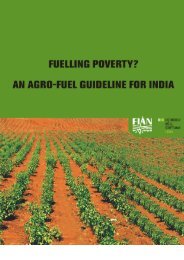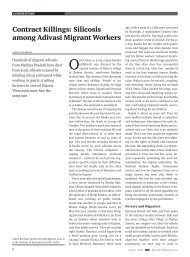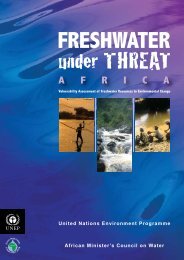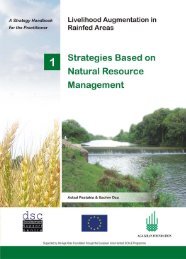Integrated River Basin Planning – Replicable ... - India Water Portal
Integrated River Basin Planning – Replicable ... - India Water Portal
Integrated River Basin Planning – Replicable ... - India Water Portal
Create successful ePaper yourself
Turn your PDF publications into a flip-book with our unique Google optimized e-Paper software.
<strong>Integrated</strong> <strong>River</strong> <strong>Basin</strong> <strong>Planning</strong>: <strong>India</strong> and the EU share experience on policy and practice<br />
INTRODUCTION<br />
a sustainable monitoring and evaluation system for water resources management<br />
and establishment of an information system on water resources.<br />
This Roadmap constitutes a blueprint for action that moves Kerala closer to its IWRM<br />
vision, starting with immediate suggested actions to develop an IWRM plan and<br />
thus towards adaption of IWRM principles. The IWRM Roadmap aims at identifying<br />
interventions, milestones and indicators for development of an action plan based<br />
on IWRM principles. The main actions identified in the Roadmap are the immediate<br />
need for operationalization of the Pamba <strong>River</strong> <strong>Basin</strong> Authority followed by adequate<br />
and thorough capacity building at state and local level in IWRM practices and the<br />
development of a full IWRM Action Plan for the Pamba <strong>River</strong>.<br />
1 Introduction<br />
A fair amount of work is needed to align Pamba’s <strong>River</strong> <strong>Basin</strong> Authority and its working<br />
structure to support the development and implementation of IWRM plans in the<br />
future as well as its constraints to water resources development. Another limitation<br />
is the insufficient enforcement of defined institutional roles and responsibilities with<br />
respect to the Pamba <strong>River</strong> <strong>Basin</strong> Authority. Another identified weakness is the lack<br />
of sharing of data and coordination between departments to constitute baseline<br />
data required for planning and decision-making..<br />
<strong>Water</strong> and Environmental Policies in the European<br />
Union<br />
In Annex 3 to this document, background information is provided on river basin<br />
management in the European Union, i.e. since the early 1970s when the first<br />
water legislation was enacted, which resulted in 2000 in the adoption of the <strong>Water</strong><br />
Framework Directive. It provides a framework for the protection of all water bodies<br />
and applies a combined approach of standardised methodologies (e.g. for setting<br />
<strong>Water</strong> Quality Objectives and Emission Limit Values) plus the adoption of overarching<br />
principles determining current water policies of the EU. The key requirements of the<br />
WFD are outlined as well. Further information on experience gained and challenges<br />
for achieving IWRM in Europe can be accessed on the website of the European<br />
Union, particularly at http://ec.europa.eu/environment/water/water-framework/<br />
index_en.html.<br />
IWRM and the EU <strong>Water</strong> Framework Directive are largely based on the same<br />
principles, but the issues they deal with are very different. IWRM focuses on peoplecentred<br />
management, sectors and economy,<br />
poverty, lowest appropriate level, gender sensitivity, public participation and<br />
decentralization. All these elements are of great importance to <strong>India</strong>, but less so<br />
to the EU WFD, which uses keywords such as protection, good status of waters,<br />
river basin management, water pricing, emission limits, streamlining legislation, and<br />
citizen involvement in planning. This supported the choice to base the Pamba pilot<br />
on IWRM principles and not on the EU <strong>Water</strong> Framework Directive. Nevertheless,<br />
there is still potential for <strong>India</strong> to review the EU WFD for elements that have proven<br />
their merit, such as a trans-boundary policy framework, institutional arrangements,<br />
and integration of sector-based interests. For purpose of reference, a summary of<br />
the EU WFD is provided in Annex 3.<br />
1.1 EU-<strong>India</strong> Joint Action Plan<br />
The EU-<strong>India</strong> Action Plan Support Facility (APSF) Programme has been designed<br />
to implement the EU-<strong>India</strong> Joint Action Plan (JAP) as adopted at the EU-<strong>India</strong> 2005<br />
Summit. The JAP outlines concrete cooperation initiatives in the field of environment/<br />
climate change in particular, to develop a dialogue on global environmental issues with<br />
a view to building mutual understanding on Multilateral Environmental Agreements<br />
(e.g. the UN Framework Convention on Climate Change and the Kyoto Protocol),<br />
hold regular meetings of the EU-<strong>India</strong> Joint Working Group on Environment and<br />
develop high-level visits. The 2005 Summit also produced an agreement to launch<br />
the EU-<strong>India</strong> Initiative on Clean Development and Climate Change as part of the<br />
JAP, linking the actions undertaken in the Environment and Energy sectors in a<br />
coherent manner and building on the work of the EU-<strong>India</strong> Energy Panel, the Joint<br />
Working Group on Environment and the newly created Environment Forum.<br />
The Action Plan Support Facility-Environment Technical Assistance, which is being<br />
implemented between December 2007 and June 2011, aims to improve policy<br />
analysis and knowledge, cooperation, regulation and civil society dialogue in<br />
relation to the environment in <strong>India</strong>. The APSF-Environment Component of the Joint<br />
Action Plan focuses on five sectors, i.e. water, waste, chemicals, air pollution and<br />
climate change, whereby technical assistance is provided by a consortium led by<br />
Euroconsult Mott MacDonald.<br />
One of the activities that have been implemented under the <strong>Water</strong> Sector of<br />
the APSF-Environment TA is the development and implementation of a pilot on<br />
<strong>Integrated</strong> <strong>River</strong> <strong>Basin</strong> <strong>Planning</strong>, i.e. for Pamba <strong>River</strong> in Kerala State. This resulted<br />
in the organization of a number of workshops on the identification of constraints and<br />
possible management interventions for Pamba <strong>River</strong>, and finally the preparation of<br />
4 5



